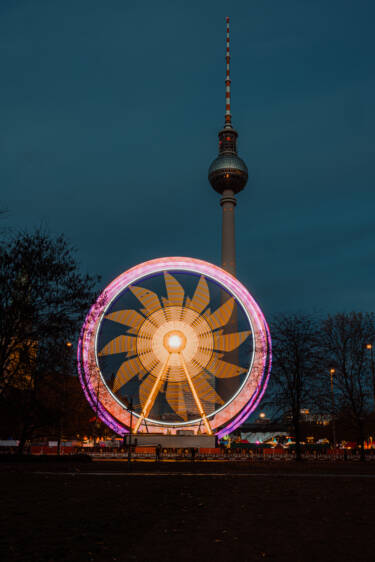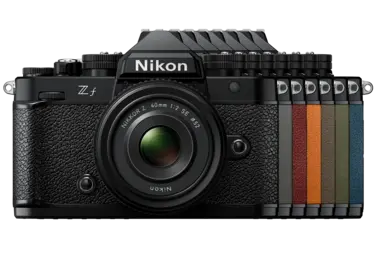9 top tips for photographing Christmas markets

Nikon Creator and street photographer Marcello Zerletti, based in Berlin, shares his go-to camera settings for Christmas markets, how to get creative with low light and his editing checklist
Christmas markets offer many opportunities to switch over to manual mode and play with lights, shutter speeds, exposure and aperture. Ready to have a go? Check out Marcello Zerletti’s top tips.
1. Don’t overlook small Christmas markets
I love photographing the traditional Striezelmarkt in Dresden, the Christmas markets in Halle and Hamburg, small markets in many small towns and, of course, various markets in Berlin, where I live, with its merry-go-rounds and Ferris wheels. I also really love small markets, where more emphasis is placed on craftsmanship, good food and tradition. For me, the best market is at Gendarmenmarkt, but this year it’s being held at Bebelplatz due to construction work.

2. Zoom lenses offer flexibility, primes offer brilliant bokeh
I currently shoot with a Nikon Z 7II and a Z f. I usually have the NIKKOR Z 24-70mm f/2.8 S or the NIKKOR Z 70-200mm f/2.8 VR S on the Z 7II and the NIKKOR Z 26mm f/2.8 on the Z f. With zooms, you can take wide-angle photos from a distance, or you can go straight into the hustle and bustle to photograph atmosphere, whereas with primes you can be inconspicuous and photograph stunning detail and produce wonderful bokeh with an open aperture.
3. Use f/2.8 aperture to highlight detail
When I’m in the thick of a market, I stay discreet with my camera and prime lens. This is where you can really open your aperture wide (f/2.8 or f/1.8 depending on your lens), increase ISO to 1000 or 2000 to freeze movements and keep the background nicely blurred to highlight the subject, whether that’s people, small stores or vendors. The many lights of the market produce wonderful bokeh with an open aperture, so bring a friend and snap their portrait here.
Read more: What is bokeh and how do I use it?


4. Don’t be afraid of high ISO
Photograph in RAW for more flexibility while editing and don’t be afraid of a high ISO. It’s always better to have a great moment with some noise than to miss the moment, as you can reduce the noise in the editing process. The moment may not come back! If you are out and about without a tripod, switch on the image stabiliser. I use automatic focusing and often also scene recognition. I also take stills in M mode, but this is not mandatory. I leave the White Balance in automatic mode because I usually personalise it during editing.
Read more: Why photograph in RAW?

5. Play with lights
Christmas markets offer so many creative opportunities to play with light. Poor light is no problem for modern Z-mount cameras, but with an image stabilizer and a higher ISO, you can easily take pictures of anything you want. The Z f even has a focus point VR, which makes it possible to take blur-free photos from the hand with a relatively long exposure of 1/10 or 1/6 sec, for example. To make fairy lights glow more, I often use a black mist filter. I really like it when there is a certain glow around the lights, but that is a matter of taste.
6. Experiment with Intentional Camera Movement
Intentional Camera Movement (ICM) is when you move your camera during the exposure for a creative effect. It often causes streaks, textures and layers in the image and, with all the beautiful fairy lights at Christmas markets, it will definitely produce great results. Start by picking a subject. Then set up your composition and select your settings before moving your camera while pressing the shutter. Try out different speeds and movements and be creative!

7. Draw your viewer’s attention to your subject
I like my photos to be minimalist and calm. For legal reasons, I try to avoid people being able to recognise faces in the photos. That’s why I photograph people either from behind, or as a silhouette or blurred in motion, almost always with a landmark or something similar in the background. To make the pictures livelier, I often have a person or a cyclist walking or riding through, which also serves as a size comparison. My pictures are never overloaded with lots of things. I like to take pictures in the dark or at dusk. I try to reduce everything and often only have one light source and one person in the picture. This draws the viewer’s attention completely to one subject.


8. Feeling confident? Try long exposure
For long exposure, I use a small tripod, or I place the camera on a suitable object, such as a letterbox or simply on the floor. When I shoot long exposure of rides for example, I set up my tripod outside the market. That way I can take my time with the shots and not get in anyone’s way, paying particular attention to the lines and the patterns that result from the movements. Keep your eye out for reflections, such as puddles or windows, which you can include in your composition. I usually take these photos with a closed aperture, such as f/8 to f/10, so that everything is in focus throughout. I wouldn’t close the aperture much wider than f/14, otherwise diffraction blur will set in.
Sometimes, I also use graduated neutral-density filters (GND) if I expose for a very long time. Which ND (GND) filter I use depends on how long I want to expose and how bright it is outside. When it’s dark, an ND 0.9 or an ND 1.8 is usually enough to take very long exposures, but only if you want very long exposures can you also use an ND 3.0. Plus, very long shutter speeds of several minutes are also worthwhile. I recommend using a remote control or the SnapBridge app to release the shutter so that you don’t have to touch the camera. Keep an eye on the lights and keep the shot a little darker. You can lighten the depths in the editing process. Use the histogram in the camera to better evaluate the shot, too. Plus, always ask the owner of the market if you’re allowed to take in a tripod!
Read more: So you think you know long exposure? Take our challenges to find out

9. Adjust White Balance and colours in post-production
Editing is a usually relatively quick process. I never really need more than 15 minutes. When I take a photo, I already have the result in my head. I only adjust White Balance and the colours to my personal taste and I don’t always match the actual colours. Sometimes, for example, I make the pictures warmer than they actually were in reality. I decide this image by image. Contrary to some rules, I leave dark areas dark and light areas light – I even intensify these effects. This automatically results in a high contrast and makes the image more natural in my eyes. But, again, that’s a matter of taste. I like to take my inspiration from paintings by the Old Masters such as Dürer, Rembrandt, Caspar David Friedrich, Canaletto and many more.
Street photographer, author and coach Marcello Zerletti is a Nikon Creator based in Berlin, Germany. His most recent book, Nachtfotografie (Night photography) is out on 6 December. You can follow him on his adventures here.
Read more:
More in Tips & Tricks
Featured products
Festive fun
Christmas gift guide for photographers
Get creative this Christmas with these tips & tricks

For limitless creativity






![Electronic Viewfinder Image [1] with exposure 1 in jpeg](/globalassets/digizuite/175766-en-z5_viewfinder_exposure_e_1_0.jpg/OptimizelyPhone)





